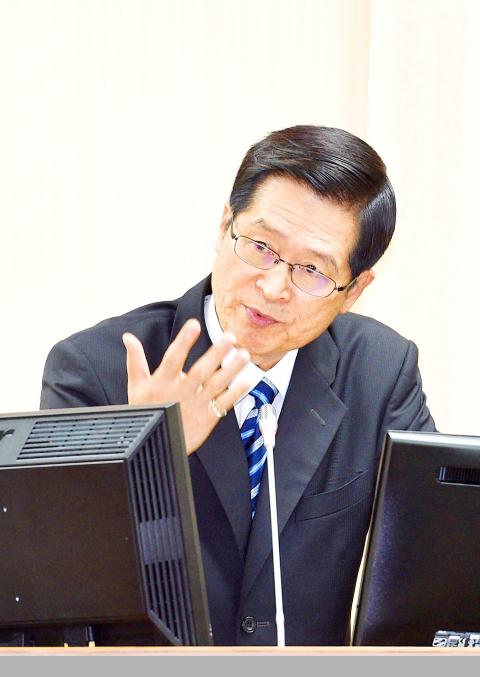Chinese Nationalist Party (KMT) Legislator Lai Shyh-bao (賴士葆) yesterday clashed with National Security Bureau Deputy Director-General Chen Wen-fan (陳文凡) over whether China is spreading fake news in Taiwan.
The exchange occurred during Chen’s report to the Legislative Yuan’s Finance Committee, which had asked the National Security Bureau to brief lawmakers on its use of budgetary items listed as “monitoring communications” and “telecom operations.”
At his turn to question Chen, Lai said: “Is it true that China is somehow influencing Taiwanese public debate?”

Photo: Peter Lo, Taipei Times
When Chen said: “Beyond a doubt,” Lai said: “You are calling Taiwanese idiots by saying this. Is there any evidence?”
Chen said a Nov. 8 story claiming that the US had annexed Itu Aba (Taiping Island, 太平島) at President Tsai Ing-wen’s (蔡英文) invitation and that Beijing had declared war was believed to have been manufactured by China.
Lai then asked Chen whether the bureau keeps tabs on people who criticize Tsai, which Chen denied.
Allowing the government to decide what is fake news endangers free speech, Lai said, adding that the National Communications Commission uses its licensing authority to harass the media.
He then said: “What is the standard for calling something fake news? Who decides?”
“That which is untrue is false,” Chen said. “The appropriate authorities make such determinations according to the only standard there is: reality.”
Later, KMT Legislator William Tseng (曾銘宗) asked whether the National Security Bureau monitors Facebook, which Chen denied.
“The bureau is focused on China and other foreign hostile forces, and the scope of operations is limited to reviewing publicly available information on public media,” Chen said. “We make no judgement and conduct no surveillance on Facebook.”

The Ministry of Education (MOE) is to launch a new program to encourage international students to stay in Taiwan and explore job opportunities here after graduation, Deputy Minister of Education Yeh Ping-cheng (葉丙成) said on Friday. The government would provide full scholarships for international students to further their studies for two years in Taiwan, so those who want to pursue a master’s degree can consider applying for the program, he said. The fields included are science, technology, engineering, mathematics, semiconductors and finance, Yeh added. The program, called “Intense 2+2,” would also assist international students who completed the two years of further studies in

Former president Tsai Ing-wen (蔡英文) departed for Europe on Friday night, with planned stops in Lithuania and Denmark. Tsai arrived at Taiwan Taoyuan International Airport on Friday night, but did not speak to reporters before departing. Tsai wrote on social media later that the purpose of the trip was to reaffirm the commitment of Taiwanese to working with democratic allies to promote regional security and stability, upholding freedom and democracy, and defending their homeland. She also expressed hope that through joint efforts, Taiwan and Europe would continue to be partners building up economic resilience on the global stage. The former president was to first

Taiwan will now have four additional national holidays after the Legislative Yuan passed an amendment today, which also made Labor Day a national holiday for all sectors. The Chinese Nationalist Party (KMT) and Taiwan People’s Party (TPP) used their majority in the Legislative Yuan to pass the amendment to the Act on Implementing Memorial Days and State Holidays (紀念日及節日實施辦法), which the parties jointly proposed, in its third and final reading today. The legislature passed the bill to amend the act, which is currently enforced administratively, raising it to the legal level. The new legislation recognizes Confucius’ birthday on Sept. 28, the

MORE NEEDED: Recall drives against legislators in Miaoli’s two districts and Hsinchu’s second district were still a few thousand signatures short of the second-stage threshold Campaigners aiming to recall Chinese Nationalist Party (KMT) legislators yesterday said they expect success in 30 out of 35 districts where drives have passed the second-stage threshold, which would mark a record number of recall votes held at once. Hsinchu County recall campaigners yesterday announced that they reached the second-stage threshold in the recall effort against Legislator Lin Szu-ming (林思銘). A total of 26,414 signatures have been gathered over the past two months, surpassing the 10 percent threshold of 23,287 in Hsinchu County’s second electoral district, chief campaigner Hsieh Ting-ting (謝婷婷) said. “Our target is to gather an additional 1,500 signatures to reach